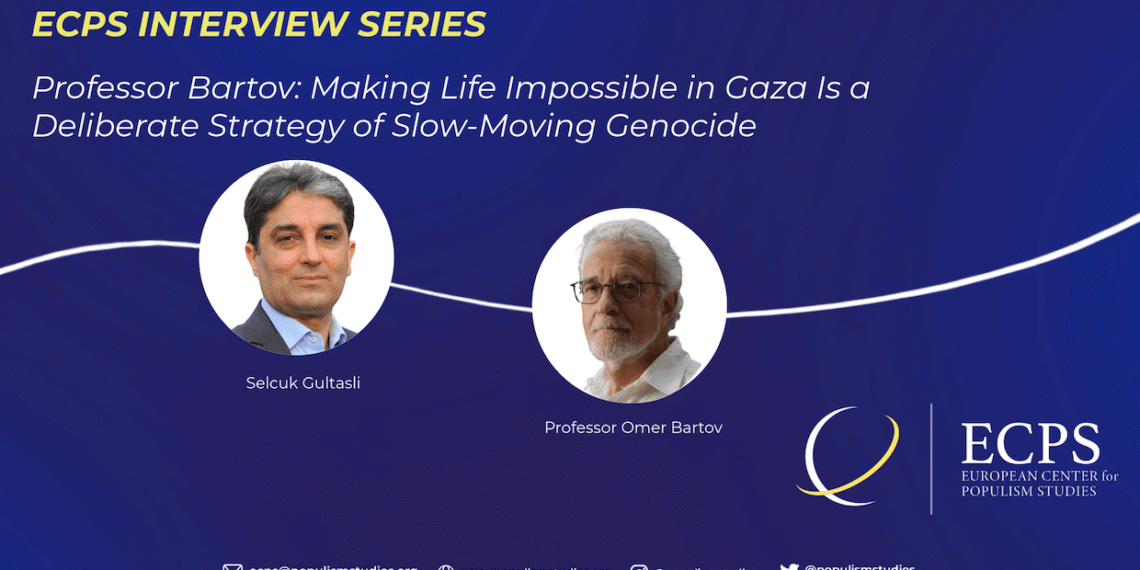In a powerful interview with ECPS, genocide scholar Omer Bartov argues that Israel’s military campaign in Gaza amounts to a “deliberate strategy of slow-moving genocide.” Drawing on the legal framework of the UN Genocide Convention and field reports from Israeli human rights groups, Professor Bartov contends that the Israeli government is intentionally making Gaza uninhabitable through starvation, displacement, and destruction of civilian infrastructure. He warns of a broader system of international complicity—what he calls a “diplomatic Iron Dome”—shielding Israel from accountability. As he dissects settler-colonial logic, media self-censorship, and the erasure of Palestinian voices, Professor Bartov issues a clear call: it is time for the world to confront both the scale of the violence and its own enabling silence.
Interview by Selcuk Gultasli
In a searing and uncompromising interview with the European Center for PopulismStudies (ECPS), Omer Bartov—Dean’s Professor of Holocaust and Genocide Studies at Brown University—offers a stark diagnosis of the ongoing war in Gaza: a deliberate strategy of “slow-moving genocide.” Drawing on decades of scholarship on genocide, historical memory, and the politics of violence, Professor Bartov asserts that Israel’s military campaign is not merely excessive or misguided but rather exhibits clear patterns of intent to destroy Palestinian society in Gaza through starvation, forced displacement, and the systematic destruction of essential infrastructure. "Making life impossible," he warns, "has become a central strategy—not an accidental consequence—of Israeli policy."
Professor Bartov’s assessment, rooted in both empirical observation and the legal definitions enshrined in the UN Genocide Convention, challenges conventional narratives that frame the Gaza campaign solely as a response to Hamas’s October 7 attacks. While condemning massacre as a war crime and crime against humanity, Professor Bartov insists that it must be placed within a broader context of occupation, siege, and settler-colonial ideology that predates the current conflict. By May 2024, he argues, the Israeli Defense Forces had clearly shifted from their stated war aims to a policy of intentional devastation aimed at rendering Gaza uninhabitable.
What makes this analysis all the more urgent, Professor Bartov notes, is not only the scale of the destruction, but the active complicity of powerful international actors. He draws particular attention to what he calls the “diplomatic Iron Dome”—a term he uses to describe the protective shield provided by the United States and its European allies, who have continued to supply arms and political cover to Israel despite growing evidence of atrocity crimes. “This is extraordinary,” he says, “because the very countries that present themselves as guardians of international law are those facilitating what may well amount to genocide.”
Professor Bartov does not exempt the Israeli media from this dynamic of obfuscation. He highlights the role of pervasive self-censorship in shaping Israeli public opinion, describing a near-total internalization of the government’s narrative that casts all Gazans as complicit in terrorism. And yet, he also sees hope in first-person Palestinian accounts—testimonies that survive, sometimes only fleetingly, before their authors are killed. These narratives, he suggests, may ultimately reshape our collective understanding of the Gaza war and expose the moral cost of international silence.
In this wide-ranging interview, Professor Bartov unflinchingly dissects the ideological, political, and historical forces behind Israel’s war in Gaza—and calls on the world to reckon with its own responsibility.


